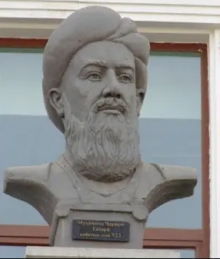Muhammad bin Jarir Al-Tabari: Difference between revisions
| [checked revision] | [checked revision] |
(→Death) |
No edit summary |
||
| (2 intermediate revisions by 2 users not shown) | |||
| Line 1: | Line 1: | ||
{{QualityScore|Lead=2|Structure=2|Content=1|Language=4|References=1}} | |||
{{Infobox Person | {{Infobox Person | ||
| name = Al-Tabari | | name = Al-Tabari | ||
| Line 13: | Line 14: | ||
| | | | ||
| }} | | }} | ||
Abu Ja'afar Muhammad bin Jarir bin Yazid Al-Tabari (Persian: محمد بن جریر طبری, Arabic: أبو جعفر محمد بن جرير بن يزيد الطبري) was an Islamic scholar, historian, and polymath. He wrote many highly influential works on the subjects of the the [[Qur'an]], history, [[fiqh]], and [[hadith]] which have come down to us. A native of the Tabaristan region of Persia, he was most likely of Persian ethnicity but wrote in Arabic. A child prodigy, he is said to have | Abu Ja'afar Muhammad bin Jarir bin Yazid Al-Tabari (Persian: محمد بن جریر طبری, Arabic: أبو جعفر محمد بن جرير بن يزيد الطبري) was an Islamic scholar, historian, and polymath. He wrote many highly influential works on the subjects of the the [[Qur'an]], history, [[fiqh]], and [[hadith]] which have come down to us. A native of the Tabaristan region of Persia, he was most likely of Persian ethnicity but wrote in Arabic. A child prodigy, he is said to have memorized the Qur'an by the age of 7, led prayers by 8 and wrote down hadith at 9, and left his home at 12 "in pursuit of knowledge" id est as a student. He travelled widely in the Middle East, returning to Baghdad around 870 to write his books and pass on his knowledge to students. His tafsir is considered authoritative to this day, and in his Taarikh al-umam wal muluuk wa taarikh al-muluuk wal rasul (تاريخ الأمم والملوك أو تاريخ الرسل والملوك) "The History of the Nations and the Kings and the History of the Kings and Prophets", often known simply as the History of Tabari, he preserves large portions of of the maghaazi of [[ibn Ishaq]] which otherwise would have been lost to us. | ||
==Early Life== | ==Early Life== | ||
Latest revision as of 05:09, 23 October 2021
This article or section is being renovated. Lead = 2 / 4
Structure = 2 / 4
Content = 1 / 4
Language = 4 / 4
References = 1 / 4
|
Abu Ja'afar Muhammad bin Jarir bin Yazid Al-Tabari (Persian: محمد بن جریر طبری, Arabic: أبو جعفر محمد بن جرير بن يزيد الطبري) was an Islamic scholar, historian, and polymath. He wrote many highly influential works on the subjects of the the Qur'an, history, fiqh, and hadith which have come down to us. A native of the Tabaristan region of Persia, he was most likely of Persian ethnicity but wrote in Arabic. A child prodigy, he is said to have memorized the Qur'an by the age of 7, led prayers by 8 and wrote down hadith at 9, and left his home at 12 "in pursuit of knowledge" id est as a student. He travelled widely in the Middle East, returning to Baghdad around 870 to write his books and pass on his knowledge to students. His tafsir is considered authoritative to this day, and in his Taarikh al-umam wal muluuk wa taarikh al-muluuk wal rasul (تاريخ الأمم والملوك أو تاريخ الرسل والملوك) "The History of the Nations and the Kings and the History of the Kings and Prophets", often known simply as the History of Tabari, he preserves large portions of of the maghaazi of ibn Ishaq which otherwise would have been lost to us.
